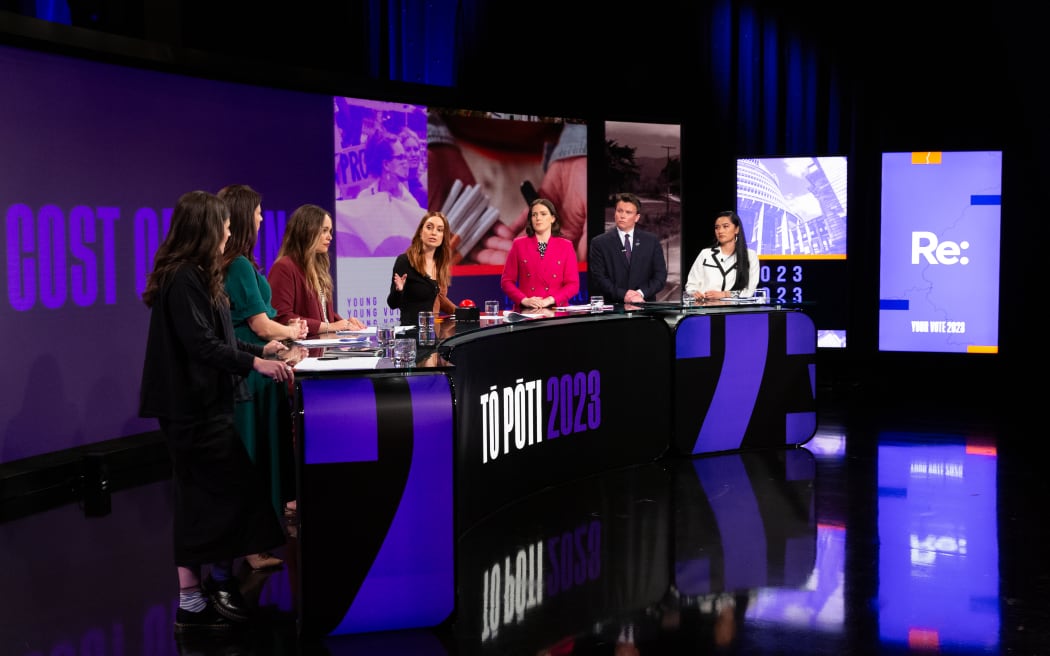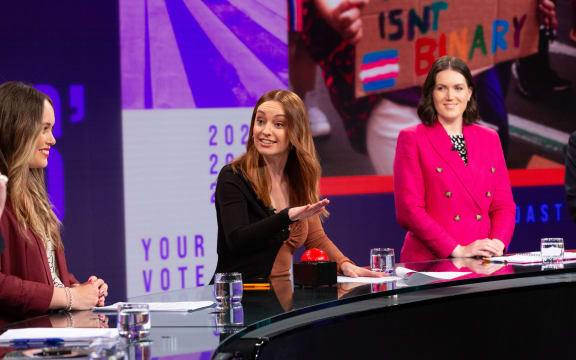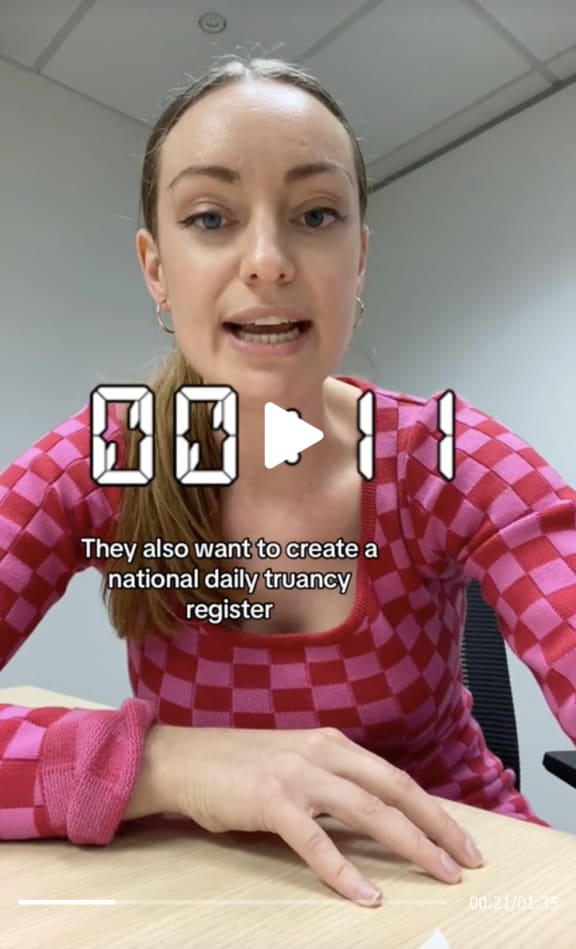Undecided voters might decide the outcome of the election and the media and political strategists are now zeroing in on them. There's also support among under-enrolled young people up for grabs, but who's trying to engage them at election time?

Participants in the TVNZ Young Voters' Debate. Photo:
The TVNZ Young Voters' debate was a rowdy interjection into what had been a relatively subdued election campaign.
It was punctuated by fiery exchanges, including one in which Green MP Chloe Swarbrick took NZ First's Lee Donoghue to task over his party's proposed ban on students using the bathroom associated with their preferred gender.
"The rhetoric and the fear-mongering behind the likes of what you and your party are putting forward are harming people in our communities because it is not evidence-based and ultimately I think there is a responsibility for political leaders to turn down the temperature on this," she said.
"We need to be able to agree to disagree," interjected Act's Brooke van Velden.
"I'm not going to deny people's existence," retorted Swarbrick.
These confrontations were also interspersed with illuminating policy debates on issues from the cost of living crisis to rainbow rights.
In one section about climate change, Donoghue confessed to having been struck by lightning at an Iron Maiden concert. He has that experience in common with National MP Maureen Pugh and Labour health minister Ayesha Verrall, both of whom say they've been struck by lightning.
The eye-opening discussions and sharply opposing points of view stood in stark contrast to the first TVNZ leaders debate between Chris Hipkins and Chris Luxon last week, where the two leaders delivered notably similar answers to quickfire questions on issues including a wealth tax (they don't want one), drug decriminalisation (they don't want it), and how old they were when they bought their first home (both were 24).
That debate ran in primetime on TVNZ 1 and was chaired by the channel's political editor Jessica Mutch-McKay. The Young Voters' Debate was run by TVNZ's youth-targeted offshoot Re:News. It ran on TVNZ's streaming service TVNZ+ and was livestreamed on social media including TikTok and You Tube.
Re:'s content editor Anna Harcourt was the moderator, armed with a ruby-red buzzer which she used bring the politicians into line when they talked too long.

Anna Harcourt prepares to bash the buzzer to keep order in TVNZ's youth issues debate last Monday. Photo: Andrew Dalton
She told Mediawatch succeeding Q+A host Jack Tame, who moderated last year's debate, was a little intimidating but she was happy with how things went.
"I see myself as the proxy for the audience. So many young people feel like politics is completely overwhelming and I am also allowed to feel those same feelings. I'm allowed to say: 'Actually, can you actually explain what interest deductibility for landlords means?'"
"There can be a strength in not already knowing everything, and I just tried to lean into that."
Given the quality of the debate, there's an an argument it - and the similarly robust TVNZ Kaupapa Māori debate the following night - deserved a primetime TV audience.
"I think there's always room for older audiences to pay attention to what younger people are thinking and feeling. I think that for older audiences, they should be paying attention to what political parties are promising younger voters, because it is the younger voters who are going to be living with the consequences for a longer time," said Harcourt.
But she noted the debate's younger target audience primarily consumes content online. The debate was also streamed live from the TVNZ studio in a vertical format to accommodate TikTok users watching on their phones.
The debate was another sign of Re:News emerging as a media force.
It began six years ago as a separate youth-focused outlet within TVNZ, and the investment has paid off, with Re: producing widely viewed coverage on issues like climate change, and garnering a growing following on outlets like TikTok and YouTube.
The platform won four Voyager Media Awards this year, including best news, current affairs, or specialist publication.
Part of its success is down to the fact that it treats younger audiences with respect with rigorous journalism on serious topics, Harcourt said.
Younger audiences want in-depth coverage as much as anyone else - but may just prefer to see the content packaged differently, she said.

Anna Harcourt hosting her Politics in 60 Seconds series Photo: Re:News
"I think the sweet spot really is in the balance between serious and light. So the topics that we deal with in our news reporting, current affairs and our long form documentary series; we take on big topics like climate change or the impact of our dairy industry," she said.
"But we also try and do it in a way that isn't just like: 'It's a very serious time, and it's time to be very serious now'. We can still be ourselves and if there is something fun, we can do something fun."
She points to her own Politics in 60 Seconds series, where she summarises important policies in a less formal setting than you might get on the 6pm news.
Re:'s audience values the authenticity in that style of presentation, whereas older audiences are more used to having their news presented by a someone speaking formally and wearing a suit, she said.
"It can sound a little bit cliched saying 'you've got to be authentic', but it's so evident to younger audiences. I think that previous generations found authority in formality. Younger audiences find that inauthentic. They think, 'oh, that's not how you actually talk. That's not actually what you that's not what you wear on the weekend'."
Harcourt told Mediawatch that while other media organisations didn't necessarily have to replicate Re:, they should at least be thinking about how to cater to younger audiences.
That meant properly funding and backing youth-targeted ventures, and occasionally allowing them to fail as they search for a formula that works, she said.
She contended that failing to invest that effort - and cash - could turn into an existential issue for media organisations.
"If they have an audience base that's aging, how are they going to engage with the digital generation? How are they going to make sure they're talking to the generations to come and the decades to come?"
"How are they keeping the audiences but also how is New Zealand going to stay informed? How are younger people or digital users going to be informed about their world and getting the news and current affairs information? It's really, really important for news organisations to back their youth platforms and their younger ventures."


